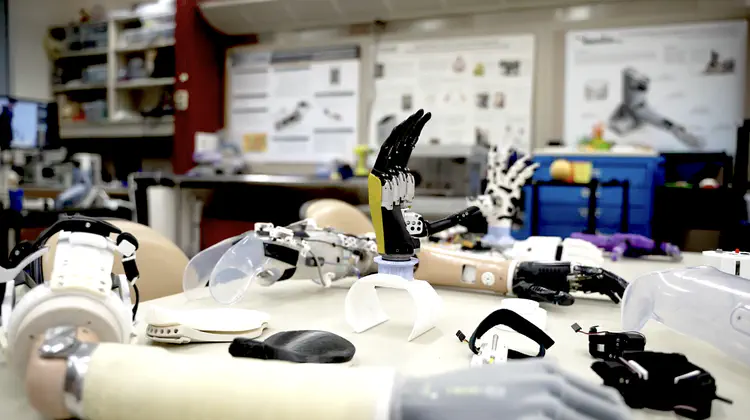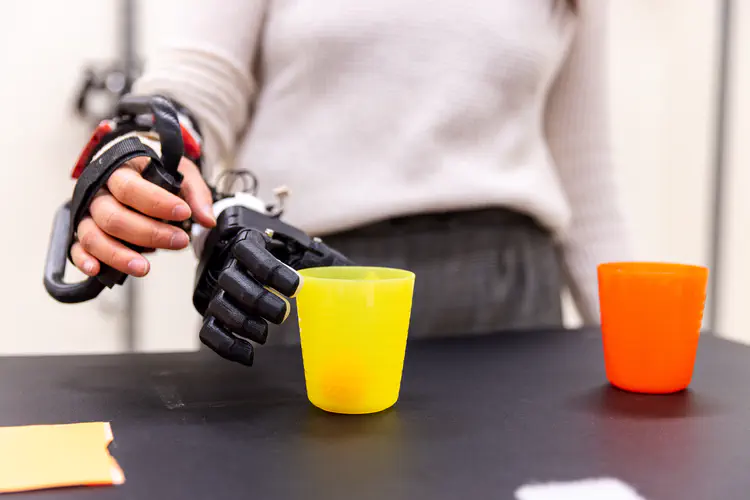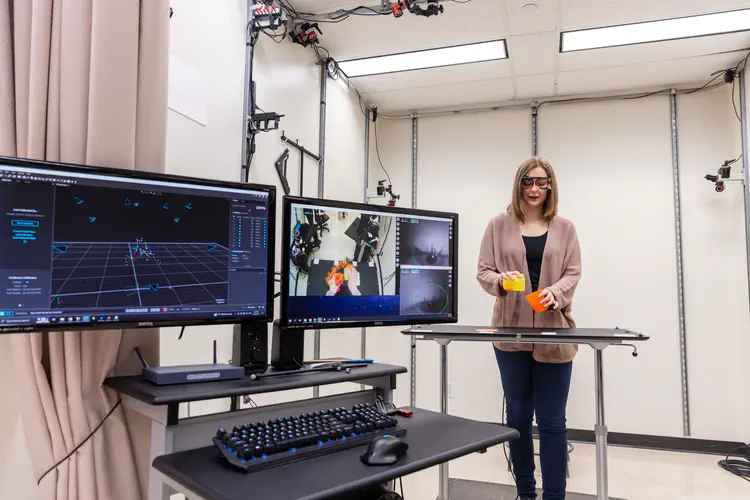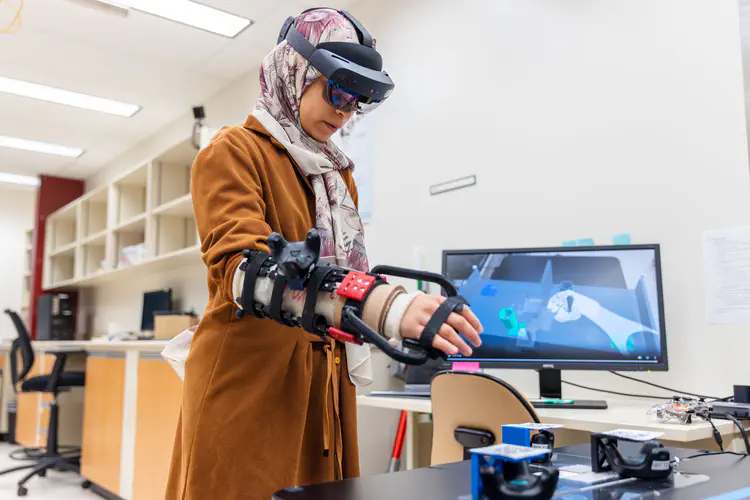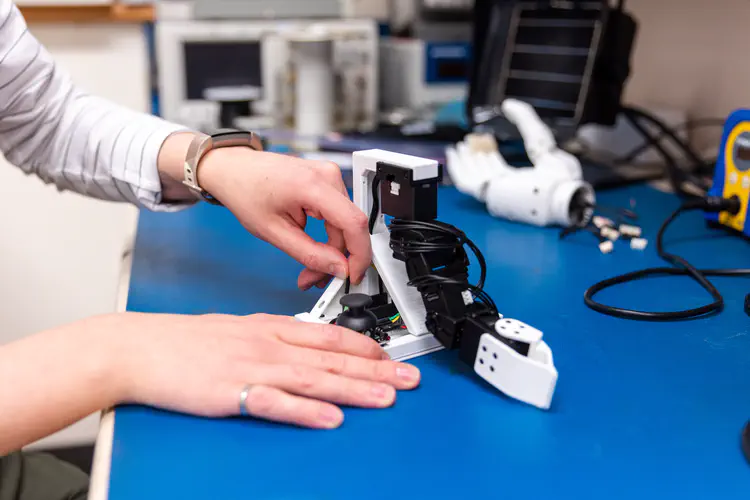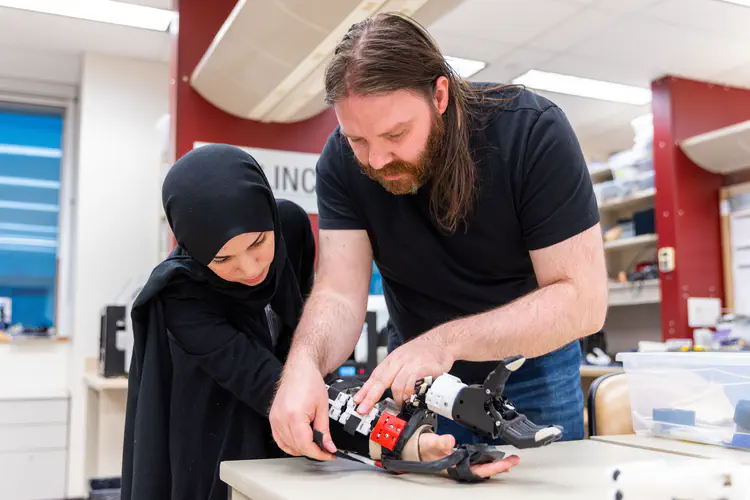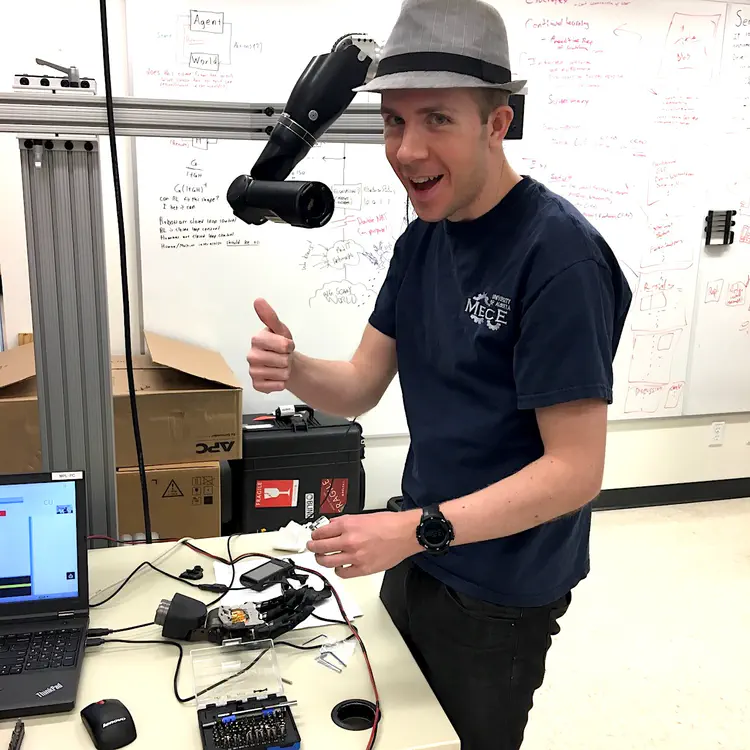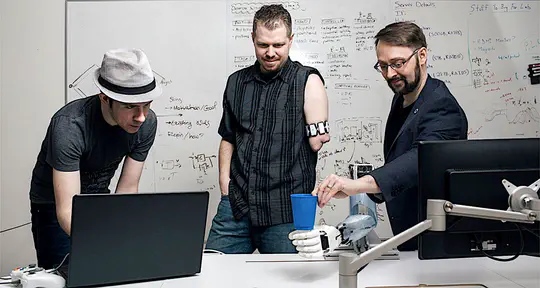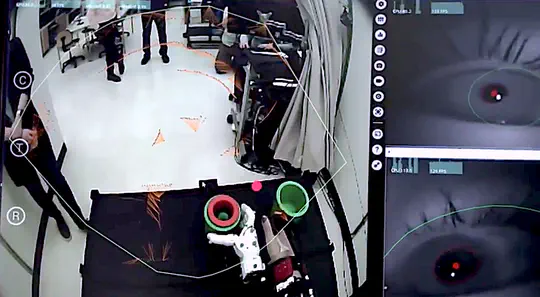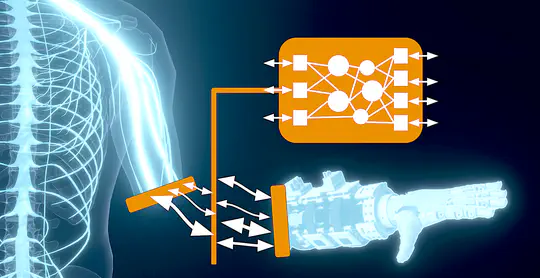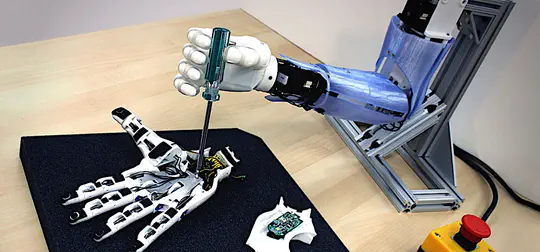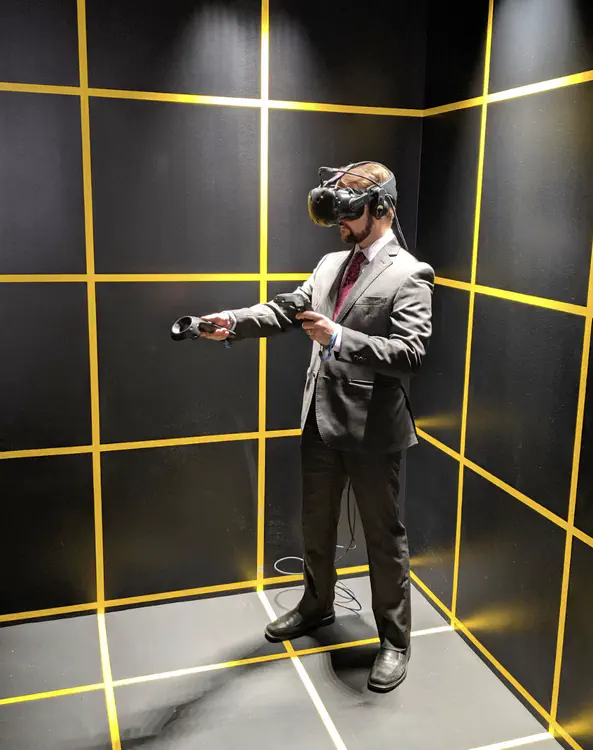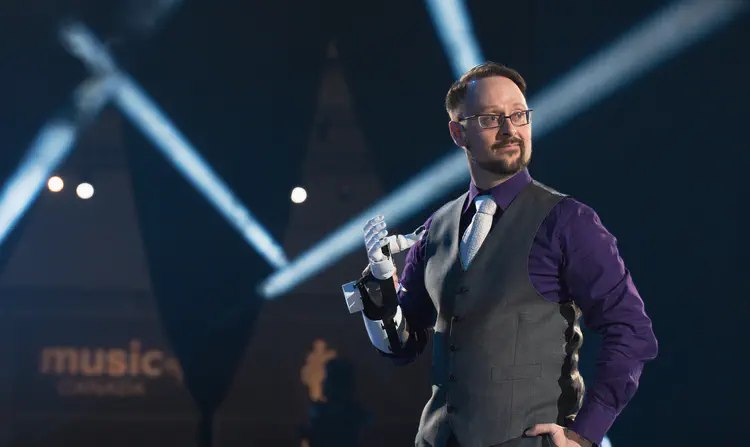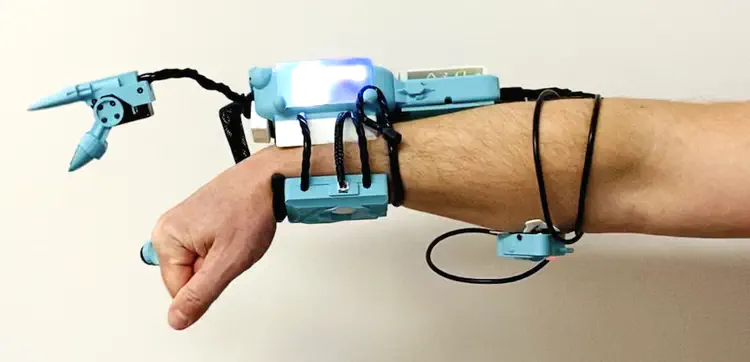Patrick M. Pilarski
Ph.D., ICD.D, Canada CIFAR AI Chair & Professor of Medicine
University of Alberta
Alberta Machine Intelligence Institute (Amii)
Biography
Dr. Patrick M. Pilarski is a Canada CIFAR Artificial Intelligence Chair (Amii), past Canada Research Chair in Machine Intelligence for Rehabilitation, and a Professor in the Division of Physical Medicine and Rehabilitation, Department of Medicine, University of Alberta. He is a Fellow and Board Member of the Alberta Machine Intelligence Institute (Amii), co-leads the Bionic Limbs for Improved Natural Control (BLINC) Laboratory, and is a principal investigator with the Reinforcement Learning and Artificial Intelligence Laboratory (RLAI) and iSMART at the University of Alberta. Dr. Pilarski received the B.ASc. in Electrical Engineering from the University of British Columbia in 2004, the Ph.D. in Electrical and Computer Engineering from the University of Alberta in 2009, and completed his postdoctoral training in the Computing Science with Dr. Richard S. Sutton at the University of Alberta in 2014. He graduated from the ICD-Rotman Directors Education Program (DEP) in 2024, and is a holder of the Institute of Corporate Directors Director designation.
Dr. Pilarski’s research interests include reinforcement learning and decision making, artificial intelligence, real-time machine learning, human-machine interaction, intelligence amplification, rehabilitation technology, and assistive robotics. He leads an interdisciplinary initiative focused on creating intelligent artificial limbs to restore and extend abilities for people with amputations. As part of this research, Dr. Pilarski has developed and made prominent machine learning techniques for continual sensorimotor control and prediction learning on prosthetic devices. These include some of the first published approaches to ongoing user training of upper-limb prosthesis control systems via reinforcement learning, and he pioneered the use of general value functions in prediction learning to continually adapt myoelectric control interfaces in real time. Dr. Pilarski’s research programme continues to explore human-device interaction and communication, long-term co-adaptation and joint action between agents, patient-specific device optimization, and constructivism in tightly coupled human-machine interfaces. He has also created techniques for rapid cancer and pathogen screening through work on biomedical pattern recognition, robotic micro-manipulation of medical samples, and hand-held diagnostic devices. With over 20 years of experience in AI and machine learning, Dr. Pilarski is the award-winning author or co-author of more than 130 peer-reviewed articles, a Senior Member of the IEEE, and has been supported by provincial, national, and international research grants.
In 2017, Dr. Pilarski was one of three Amii researchers who brought the first international research office of Alphabet Inc.’s subsidiary DeepMind to Edmonton, Alberta. He served as the office’s co-lead and a Senior Staff Research Scientist until 2023. Dr. Pilarski currently serves as a director on the board of the Alberta Machine Intelligence Institute (Amii; 2017-present) one of three national not-for-profit institutes established as part of the Pan-Canadian Artificial Intelligence Strategy. Prior to its incorporation, he served on Amii’s management advisory board within the University of Alberta (2014-2016). He also serves as a director on the board of Silvacom Holdings Corp. Dr. Pilarski regularly delivers invited keynotes to boards, business organizations, policy makers, and the general public on the growing impact of artificial intelligence on medicine, industry, and society. He previously founded a startup company, actively engages in consulting and venture investment, has created multiple arts organizations, and has further governance experience in the arts sector on steering councils and advisory boards of regional and national creative arts organizations.
- Artificial Intelligence
- Upper-limb Prostheses
- Rehabilitation Technology
- Reinforcement Learning
- Continual Machine Learning
- Human-Machine Interaction
- Intelligence Amplification
- Assistive Robotics
- Internet of Body Things (IoBT)
-
ICD.D, Directors Education Program, 2024
Institute of Corporate Directors & University of Toronto Rotman School of Management
-
Postdoctoral Fellowship, Computing Science, 2014
University of Alberta
-
Ph.D., Electrical and Computer Engineering, 2009
University of Alberta
-
B.ASc., Electrical Engineering, 2004
University of British Columbia
Academic Appointments
Trainees & Visitors
PhD Student, Dept. Biomedical Engineering
PhD Student, Dept. Computing Science
PhD Student, Dept. Computing Science
MSc Student, Dept. Mechanical Engineering
MSc Student, Dept. Technology Systems, University of Oslo
MSc Student, Dept. Computing Science
MScRS Student, Faculty of Rehabilitation Medicine
MSc Student, Dept. Computing Science
Visiting Professor, 2019-2020, from Fujita Health University, Nagoya, Japan
Visiting Professor, 2018-2019, from Fujita Health University, Nagoya, Japan
Visiting Professor, 2017-2018, from Fujita Health University, Nagoya, Japan
Visiting Professor, 2017-2018, from the National Center for Geriatrics Gerontology, Nagoya, Japan
PhD, Faculty of Rehabilitation Medicine, 2024
PhD, Dept. Biomedical Engineering, 2024
PhD, Dept. Computing Science, 2023
PhD, Dept. Computing Science, 2023
PhD, Dept. Computing Science, 2020
PhD, Dept. Computing Science, 2019
Postdoctoral Fellow, Dept. Computing Science, 2018-2020
MSc, Dept. Mechanical Engineering, 2019
MSc, Dept. Computing Science, 2018
MSc, Dept. Computing Science, 2017
MSc, Dept. Computing Science, 2017
MScRS, Faculty of Rehabilitation Medicine, 2016
MSc, Dept. Computing Science, 2015
Undergraduate Researcher
Undergraduate Researcher
Undergraduate Researcher
Undergraduate Researcher
Undergraduate Researcher
Undergraduate Researcher
Undergraduate Researcher
Undergraduate Researcher
Undergraduate Researcher
High School Researcher
Undergraduate Researcher
Undergraduate Researcher
Undergraduate Researcher
Undergraduate Researcher
Undergraduate Researcher
Undergraduate Researcher
High School Researcher
Research Snapshots
Selected Videos
Non-Research Interests
Patrick M. Pilarski served as the co-editor of DailyHaiku, an international journal of contemporary English-language haiku, and poetry editor for its sister publication DailyHaiga. He is author of the poetry collection Huge Blue (Leaf Press, 2009), and the chapbooks Contemplating Vows (with Nicole Pakan; Katabatic Books, 2011) and Five Weeks (2007). Patrick’s creative writing has appeared in journals and anthologies across North America, Europe, Australia, and Japan, and on CBC Radio One as part of the CBC Poetry Face-off. A long-time member of the literary community, he has served as an organizer for the Edmonton Poetry Festival and as the Vice President of the League of Canadian Poets.
Other Non-Technical Pursuits:
- Blacksmithing;
- Scuba diving and martial arts;
- Acting and musical theatre;
- Hiking, backpacking, and travel;
- Gardening and tropical fish keeping;
- Graphic design, brush painting, and visual art.
Featured Publications
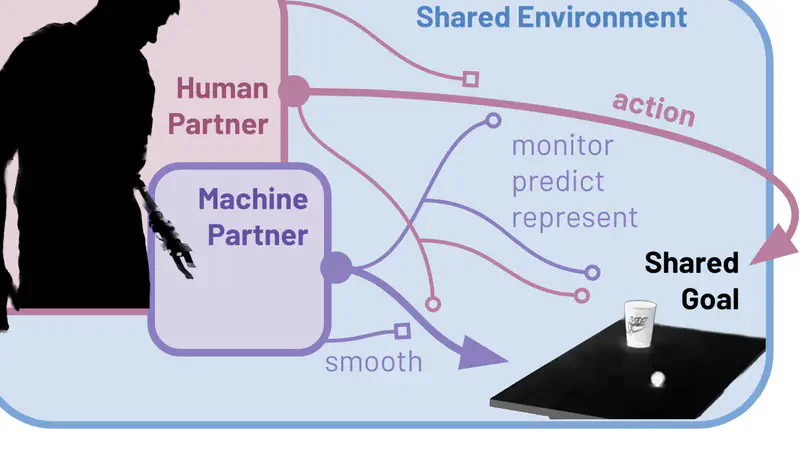
This work contributes a conceptual analysis of upper-limb prosthesis control methods; the goal of this work is to deliver new insight into the design of future biomechatronic systems intended for human interaction. Recent advances in upper limb prostheses have led to significant improvements in the number of movements provided by a user’s robotic limb. However, controlling multiple degrees of freedom via muscle-generated (myoelectric) signals remains challenging for individuals with limb difference. To address this issue, various machine learning controllers have been developed to better predict a user’s movement intent. As these controllers become more intelligent and take on more autonomy in the system, the traditional approach of representing the human-machine interface as a human controlling a tool becomes limiting. We here suggest that one possible approach to improve the understanding of these interfaces is to model them as collaborative, multi-agent systems through the lens of human-prosthesis joint action. The field of joint action has been commonly applied to two human partners who work jointly together to effect coordinated change in their shared environment. Using a joint action framework also provides opportunities to understand the interactions between human and machine partners: how each represents the other’s goal, their monitoring and prediction of each other’s actions, the communication between them, and their ability to adapt to each other. In this work, we survey three different prosthesis controllers—proportional electromyography with sequential switching, pattern recognition, and adaptive switching—in terms of how they present the hallmarks of joint action. The results of this comparison contribute a new perspective for understanding how existing myoelectric systems relate to each other, along with two concrete recommendations for how to improve these systems via additional capacity for prediction learning and coordination smoothing.
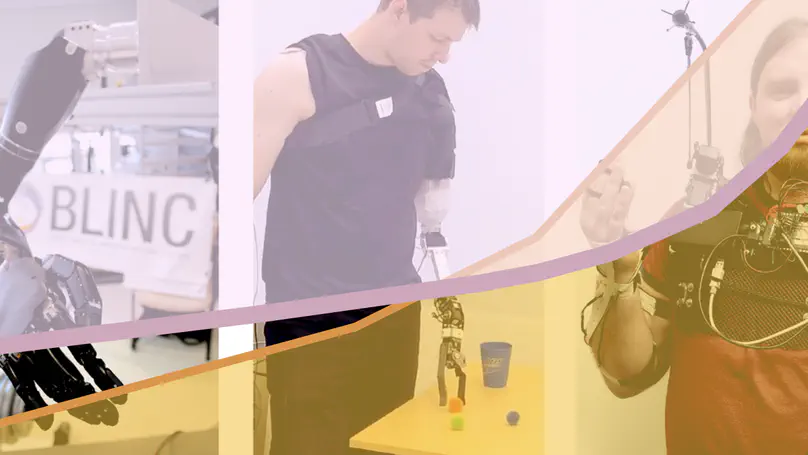
In this work, we present a perspective on the role machine intelligence can play in supporting human abilities. In particular, we consider research in rehabilitation technologies such as prosthetic devices, as this domain requires tight coupling between human and machine. Taking an agent-based view of such devices, we propose that human–machine collaborations have a capacity to perform tasks which is a result of the combined agency of the human and the machine. We introduce communicative capital as a resource developed by a human and a machine working together in ongoing interactions. Development of this resource enables the partnership to eventually perform tasks at a capacity greater than either individual could achieve alone. We then examine the benefits and challenges of increasing the agency of prostheses by surveying literature which demonstrates that building communicative resources enables more complex, task-directed interactions. The viewpoint developed in this article extends current thinking on how best to support the functional use of increasingly complex prostheses, and establishes insight toward creating more fruitful interactions between humans and supportive, assistive, and augmentative technologies.
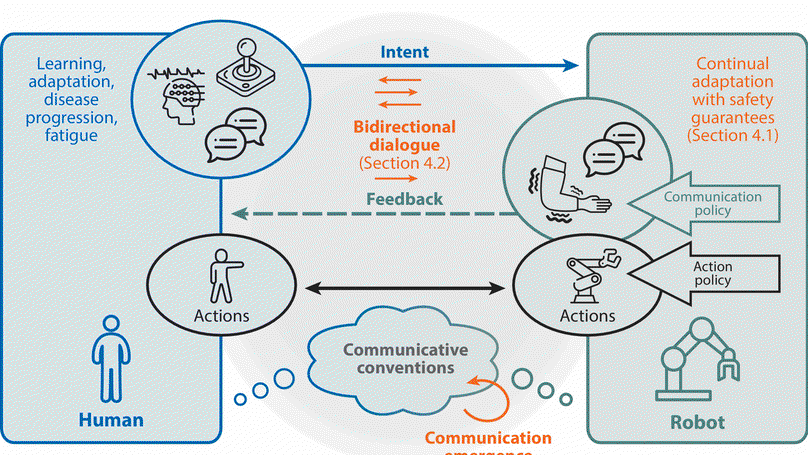
Early research on physical human–robot interaction (pHRI) has necessarily focused on device design—the creation of compliant and sensorized hardware, such as exoskeletons, prostheses, and robot arms, that enables people to safely come in contact with robotic systems and to communicate about their collaborative intent. As hardware capabilities have become sufficient for many applications, and as computing has become more powerful, algorithms that support fluent and expressive use of pHRI systems have begun to play a prominent role in determining the systems’ usefulness. In this review, we describe a selection of representative algorithmic approaches that regulate and interpret pHRI, describing the progression from algorithms based on physical analogies, such as admittance control, to computational methods based on higher-level reasoning, which take advantage of multimodal communication channels. Existing algorithmic approaches largely enable task-specific pHRI, but they do not generalize to versatile human–robot collaboration. Throughout the review and in our discussion of next steps, we therefore argue that emergent embodied dialogue—bidirectional, multimodal communication that can be learned through continuous interaction—is one of the next frontiers of pHRI.
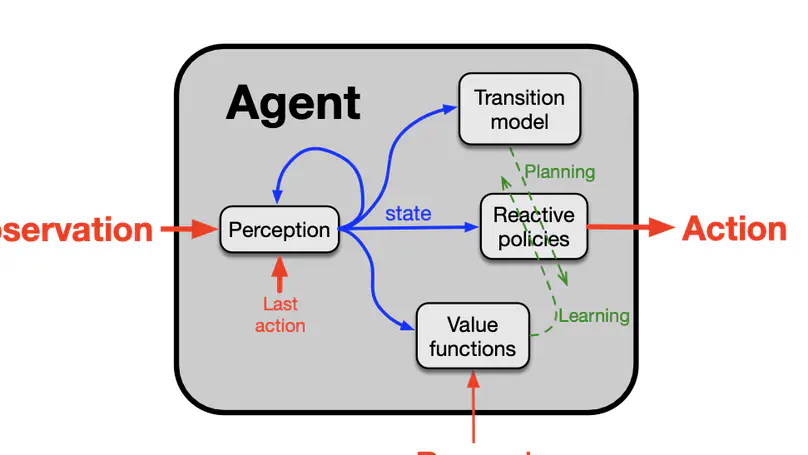
Herein we describe our approach to artificial intelligence research, which we call the Alberta Plan. Following the Alberta Plan, we seek to understand and create long-lived computational agents that interact with a vastly more complex world and come to predict and control their sensory input signals. The agents are complex only because they interact with a complex world over a long period of time; their initial design is as simple, general, and scalable as possible. To control their input signals, the agents must take action. To adapt to change and the complexity of the world, they must continually learn. To adapt rapidly, they must plan with a learned model of the world. The purpose of this document is twofold. One is to describe our vision for AI research and its underlying intellectual commitments and priorities. The second is to describe the path along which this vision may unfold and the research problems and projects that we will pursue.

Learned communication between agents is a powerful tool when approaching decision-making problems that are hard to overcome by any single agent in isolation. However, continual coordination and communication learning between machine agents or human-machine partnerships remains a challenging open problem. As a stepping stone toward solving the continual communication learning problem, in this paper we contribute a multi-faceted study into what we term Pavlovian signalling – a process by which learned, temporally extended predictions made by one agent inform decision-making by another agent with different perceptual access to their shared environment. We seek to establish how different temporal processes and representational choices impact Pavlovian signalling between learning agents. To do so, we introduce a partially observable decision-making domain we call the Frost Hollow. In this domain a prediction learning agent and a reinforcement learning agent are coupled into a two-part decision-making system that seeks to acquire sparse reward while avoiding time-conditional hazards. We evaluate two domain variations: 1) machine prediction and control learning in a linear walk, and 2) a prediction learning machine interacting with a human participant in a virtual reality environment. Our results showcase the speed of learning for Pavlovian signalling, the impact that different temporal representations do (and do not) have on agent-agent coordination, and how temporal aliasing impacts agent-agent and human-agent interactions differently. As a main contribution, we establish Pavlovian signalling as a natural bridge between fixed signalling paradigms and fully adaptive communication learning. Our results therefore point to an actionable, constructivist path towards continual communication learning between reinforcement learning agents, with potential impact in a range of real-world settings.
Student Dissertations
Peer-Reviewed Publications, Abstracts, & Preprints
Selected Talks
Selected Course Websites:
- CMPUT 607, Applied Reinforcement Learning, Winter 2018
- CMPUT 607, Applied Reinforcement Learning, Winter 2017
- CMPUT 609, Reinforcement Learning in Artificial Intelligence, Winter 2015
Recent Media Coverage
- May 23, 2023: CTV Morning Live (TV/Video Interview)
- May 23, 2023: Unite.AI (Print Interview)
- Mar. 10, 2023: Global News Edmonton (TV/Video Interview)
- Mar. 9, 2023: CBC Radio One: RadioActive (Radio Interview)
- Mar. 8, 2023: CTV News Edmonton (TV/Video Interview)
- Aug. 8, 2022: CBC Edmonton AM (Radio Interview)
- July 29, 2022: Taproot News (Print Coverage)
- June 22, 2022: Edmonton Mayor’s Office (Community Leader Spotlight Video)
- Feb. 25, 2022: CTV News Edmonton (TV/Video Interview)
- Jan. 27, 2022: Edmonton Global (Feature Video)
- Apr. 9, 2019: Canadian Press / CBC News / Globe & Mail (Syndicated News Article)
- Mar. 23, 2017: Global News Edmonton (TV/Video Interview)
- Feb. 15, 2017: Embedded.fm (1.25h Long Audio Interview)
- Jan. 12, 2017: Global News Edmonton (TV/Video Interview)
Contact
For Dr. Pilarski’s interview details and biographical notes only,
For Dr. Pilarski’s full media kit (~32MB) including photos and biographical notes,
- patrick.pilarski@ualberta.ca
- Katz Group Centre for Pharmacy and Health Research, University of Alberta, Edmonton, AB T6G 1G7
